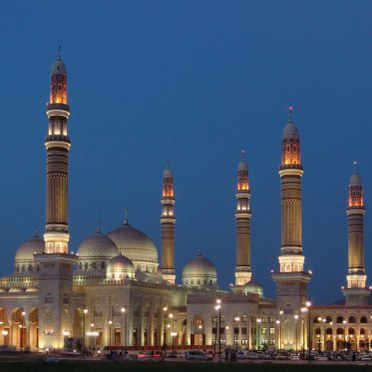Al Saleh Mosque, Yemen
- Lamp efficacy
Lamp efficacy
Ensuring the lamp efficiently converts electricity into light (lm/W).
- Ballast classification
Ballast classification
Controlling the electricity supply to the lamp (Energy Efficiency Index).
- Luminaire distribution
Luminaire distribution
Controlling light emission using optics which bend and shape the light to the correct location.
- System efficacy
System efficacy
Combining optical and thermal control within the luminaire (luminaire lm/W).
- Presence/absence detection
Presence/absence detection
Providing lighting only when it’s needed.
- Daylight detection
Daylight detection
Reducing waste light during daylight hours.
- Constant illuminance
Constant illuminance
Producing the correct lighting levels for the duration of the maintenance period.
- Task-scene setting
Task-scene setting
Allowing the user to set scenes and adapt the lighting to different tasks.
- Timed off
Timed off
Automatic cut-off to turn all lights off during unoccupied hours.
- Task lighting
Task lighting
Lighting task areas with the correct amount of light.
- Zoning of lighting
Zoning of lighting
Zoning lighting in accordance to occupancy patterns or window location.
- Maintenance schedule
Maintenance schedule
Tailoring maintenance schedules in accordance to product age, performance and environment.
- Waste light
Waste light
Eliminating waste light which does not hit the intended target.
- Reflectance
Reflectance
Taking advantage of light which is reflected from the surface within the space.
- Visible smart metering
Visible smart metering
Enabling results of actions to be quickly seen as increased or decreased energy use to encourage responsible energy consumption.
Yemen's 'national wonder' lit by Thorn
'A national wonder...' That's how a leading Middle East website describes the newly built Al Saleh mosque in the Yemeni capital Sana'a. Thorn International Sales through its local distributor Al Zaghir, has played a major part in lighting the majestic building
Outstanding feature of the scheme is the floodlighting, which combined considerable imagination and sensitivity with a thoroughly professional grasp of the problems of engineering and light distribution involved. Built at the President's expense to accommodate 44,000 worshipers, the $60 million Mosque combines Yemeni architecture with classic Islamic elements, such as minarets, domes and arches.
Using a mix of Contrast and OQ 1000 floodlights allowed great flexibility in the play of light upon the exterior and ground recessing certain projectors made it inconspicuous in daylight. Flow of light techniques were relied upon rather than dramatic use of spotlighting and by this means over-emphatic highlights and shadows were avoided, as was obtrusive light. The scheme is striking and the six minarets, each soaring 100 metres high, are visible from a considerable distance at night.
Such a complex project made for numerous lighting calculations, and even if lighting levels could be mapped over drawings, the aesthetic quality of the light could only be judged by the eye. So Thorn used 3D design software to supply colour rendered rotational visualisations to the client for a mock-up of the lighting effects. It was then possible to see the modelling which had been impossible to draw and to arrive at the best range of brightness and colour in the quality of the light.

